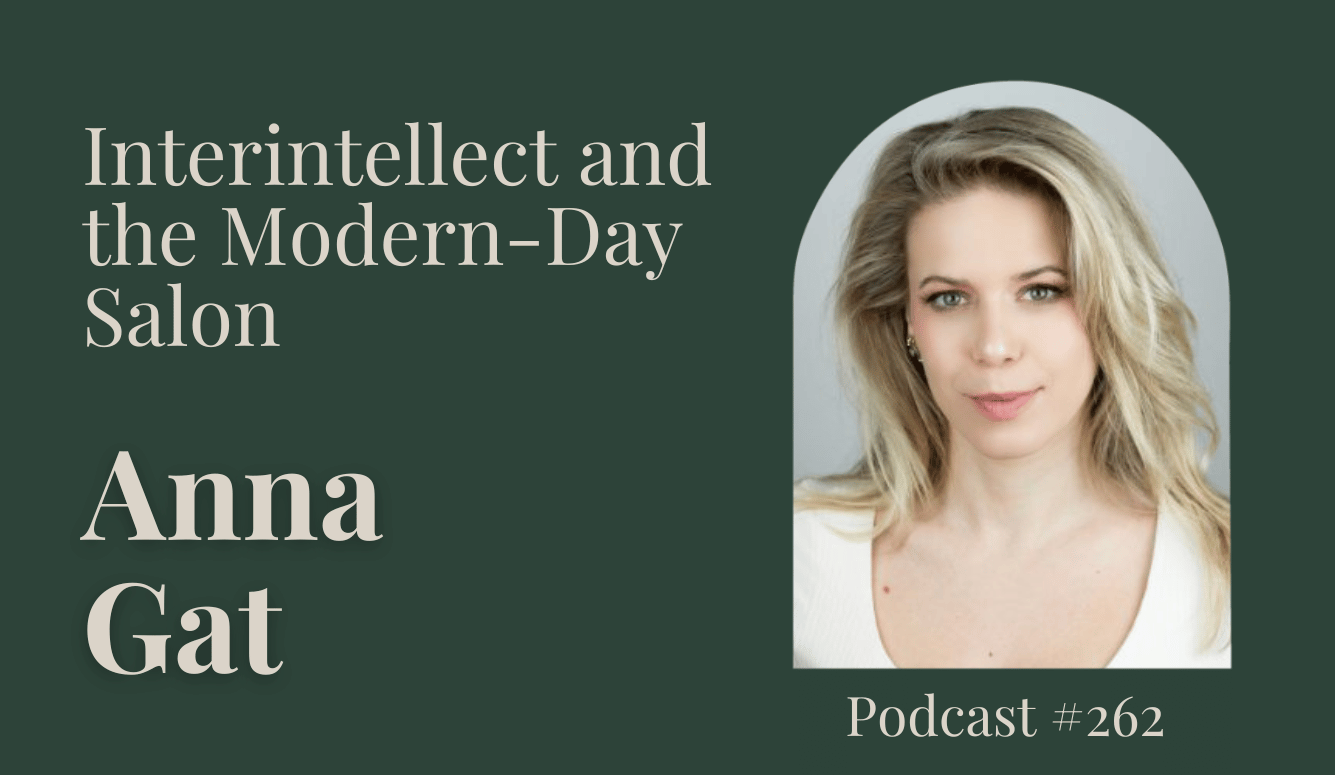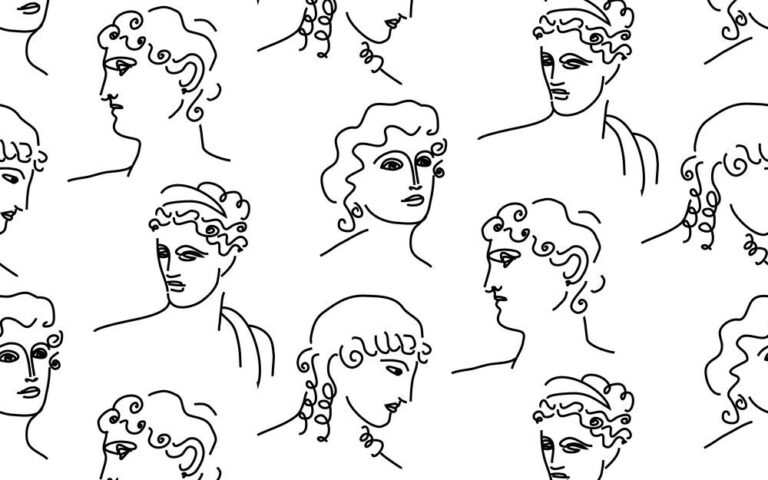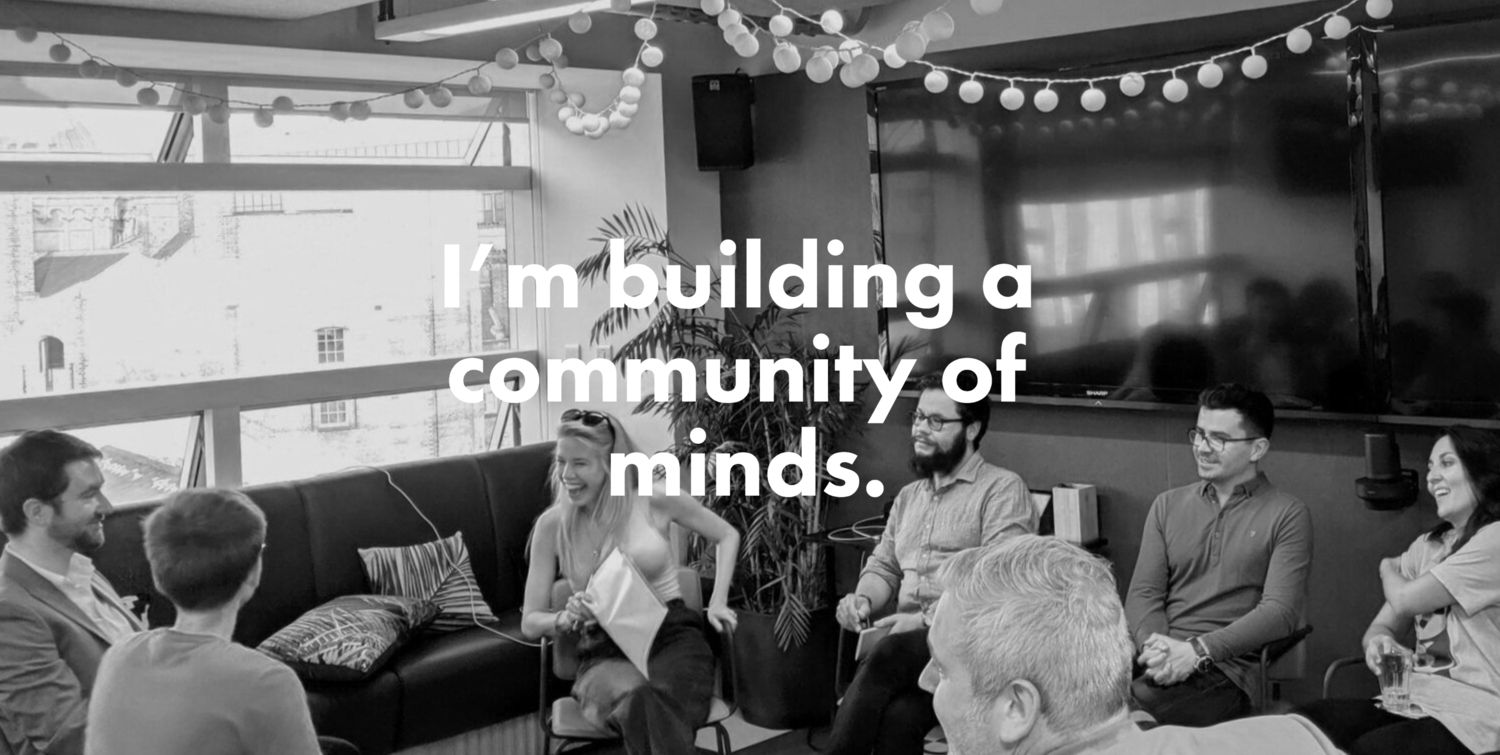Podcast
Podcast #262: Interintellect and the Modern-Day Salon
Iona Italia talks to globetrotter and intellectual magpie Anna Gat about her modern-day salon, Interintellect.

Introduction: My guest this week is Anna Gat. Anna is a Hungarian émigré who is now happily based in New York. A former poet, screenwriter, and playwright, in 2016 Anna founded Interintellect: a platform that allows people to create discussion forums, talks followed by Q&A sessions, and more informal meetups, both online and in person. Interintellect now hosts one or two salons every day and subscribers to the platform number in the tens of thousands. Anna is also the host of the podcast The Hope Axis. She has had an extraordinarily varied, kaleidoscopic, cosmopolitan, and intellectually rich life. We discussed Hungary and the Orbán regime; Girardian triangulation; Elective Affinities; finite and infinite games; linguistics; Christianity; accelerationism; autists; love, sex, and Milan Kundera; and many other topics. I hope you enjoy my conversation with Anna Gat.


Iona Italia: I’d like to start with a few questions about you yourself, because I am quite fascinated by your background.
Anna Gat: Let’s see if we can do it.
II: You’ve said in a couple of places that you had to restart your life more than once. I think on Twitter, you once said, “I’m a former nepo baby turned self-made person. I’ve lost everything and everyone multiple times in my life.” And elsewhere, you said that most recently you had to restart your life in January 2015 “with nothing and no one, with zero pedigree, as a nobody immigrant.” So, I’d like to hear about how that happened.
AG: Follow me on Twitter, people—it’s light-hearted fun, no big topics ever. Yes, sometimes I like to joke on Twitter about things and then interject sometimes some super-deadly serious autobiographical tweet just to shake up my brand a little bit, just to keep it light.
II: Yeah, so tell me about that. Give me a little bit of a rundown of your life and especially the times you lost everything and how you bounced back from that.
AG: So I’m 40 and basically, I had to restart really really fundamentally 10 years ago, but I had multiple restarts in my life. The most dramatic was 10 years ago when I had a family cataclysm happening to me after I had moved away from Budapest—probably this was also related: the family stability was a little bit shaken up by my having left and some maybe more sinister forces took over. And there was a very violent event in my life at the time as a woman that made me first of all wake up from a very long period of self-gaslighting and also go through a period when I gradually first lost everything: materially, familiarly, my private life as well, which was already shocking to my system because I had just immigrated.
So I had a soft losing of everything because when I was 30, I packed up my life in Budapest because of politics and the economy and the whole horror that started happening there with the [Viktor] Orbán regime. And after a long period of hesitation, I packed up. I was 30 and I was pretty well known and very successful, a child of successful people, but I made myself a successful person on my own right by the age of 30. And this was literally packing my entire life of 30 years into three suitcases, renting out my apartment, putting down the car key, kicking out my boyfriend. I sold all of my clothes. I knew that I was never going to go back. And then the family cataclysm happened around one and a half years after this.
So I already had much less and that this wiped everything away from me. It took me 10 years. I’m only just now coming back. I think for women who have to experience this kind of intimate violence and really go back to the core of their animal survival instincts and start often with the clothes on your back, it takes a lot of time.
One of the things that I meditate a lot on these days is that even if I figure out my life going forward and even if I do everything correctly and I really use my talent and my knowledge and my people skills to the best possible level, I still was robbed of that amount of time and I think this is what violence does to people—whether that’s in a war or in a personal situation—you lose decades of your life. We rarely talk about this. It’s like somebody robbing you from a decade of your life without you ever asking for it or ever doing anything to earn it. It’s not like imprisonment, but it’s a similar loss of lifetime. To me, that’s a great tragedy. So I’m trying to hedge my current life to make up for this lost time.
II: So, you talked about leaving Hungary because of the Orbán regime. It’s one of the things that’s very much disappointed me within the kind of heterodox space in which I move is that so many people feel that they’ve found a home away from woke culture working basically for Orbán’s government or for Hungarian institutions. I’m not going to name specific people, but a number of anti-woke thinkers who I otherwise admire seem to be either in the pay of Hungarian institutions or are going to a lot of seminars and meetings in Hungary. I’ve actually been invited to join a few myself, which I’ve declined. And the one thing that they are unwilling to talk about, mention, or criticise is Orbán and his regime. So I would love to hear more about what was happening when you left Hungary, whether you have been following developments since then. I’d like our listeners to hear more about your critiques of the regime.
AG: I would like to put forward that I will talk about this a little bit, but I’m really scared. And one of the reasons why I don’t talk about this publicly is because I have family and relations in Hungary. And by my criticising the regime publicly on an Australian podcast, I might be putting myself to danger. I might get my phone tapped. My company might be discredited in the Hungarian propaganda media. And there are other adjacent dangers, even if you live in New York City. So just to put it forward, if anything happens to me after speaking about this, you will know that this was because I came to the Quillette podcast and spoke about this openly.
II: All right, we won’t talk about that then.
AG: No, no, I really would like to say a few things, but this is important, right? Because for you to understand how serious the situation is, you need to understand that somebody who immigrated 11 years ago and is currently on a different continent is still at risk by criticising these people who hold … I mean, whatever your heterodox friends and mine think about this, that regime does not care about civic liberties and people’s private property or freedom of expression. These things are not things that anybody in Hungary holds dear currently in the regime, or that would be in any way encouraged to hold as a priority.
I’m art of this very lucky/unlucky millennial generation. I was 20 years old when Hungary joined the EU and went to college in Budapest and completed two master’s degrees there at ELTE when we were living in this period of liberalism. So we’re talking about the mid 2000s, the mid-aughts. It was a time of globalist fantasies, openness, a belief in free trade. A lot of artistic cultural projects were happening. A lot of foreign capital was still flowing into the country. And my generation was lulled into the belief that we were going to be a European country with European liberal democratic values. And that talented, multilingual, intellectual classes would be able to live in Budapest and work to the benefit of their country.
Hungary is a very, very patriotic place and we all grew up deeply believing in Hungary as a country. I still do. We are a unique language. We are extremely distantly related to only two other languages in the world currently spoken. So, this kind of cultural exceptionalism, all the noble laureates, all the poets, etc. etc. … So we are very full of ourselves, I think, Hungarians. If you go there, you will see. Maybe for a good reason, I don’t know, but we’re definitely raised that way.
So for us, the Hegelian logic of it was that we go through these 50 years, or 50-year period of communism, and then we somehow figure out through trial and error how to build a democracy. As a European democracy, obviously the next step would be to open toward the West and become part of the Western community. Hungarians are also endowed with a massive inferiority complex, so we have a very complicated relationship with the West. We desperately want to be Western. During the Austro-Hungarian monarchy, we spoke German to flex. It’s a little bit like Russian and French cultures. There is both a desire to be included and a constant fear of rejection. And so urbanist revolution in 2009 happened in this environment.
So, you have this blessed moment. I was 26, 25, and we knew that something was wrong because in 2008, the recession started happening. And that’s just when I finished university, and I got my master’s degrees, and I was about to enter the job market when suddenly there were no jobs. So we felt that something was happening in the ether.
And into that came this giant cultural revolution that Orbán had engineered. When he lost in 2002, he spent the years outside the government preparing and experimenting what narrative would resonate to people. And since they gradually got rid of the Christian conservative party, and they had left the parliament, Orbán came and filled that cultural sphere. It was really, really interesting. I do think that if you listen to the Hungarian cultural narrative today, I as a Christian don’t think that it’s a particularly Christian narrative. I do think that a Christian country would be extremely altruistic, caring, and cherishing of, for instance, children, women, the elderly. This is not necessarily the case in my home country today. But the narrative that they struck, that they really carefully engineered and keep engineering, has a Christian conservative tilt to it, but just enough to make people feel that they have already done the work, and they can just now enjoy and feel good about themselves. It’s a perfect linguistic genius.
And so in 2009 starts this process when both the jobs are disappearing and my circles—and this is like Budapest intelligentsia, the old-timey city life of universities and libraries and theatres; it’s a very old fashioned way of living, with interesting scientific and cultural experiments happening. EU money suddenly floods into the country. People are winning grants, building new exhibitions, new theatres, new clubs. So it’s a boom moment. This is what gets wiped away.
And so in 2009, people start moving away, so this exodus happens when at first the educated classes try to fight back, new parties are mushrooming, people are very political at this point, there are a lot of demonstrations, a lot of cultural projects. And
Orbán comes into power and starts figuring out how they can remove the foundations from underneath this cultural organisation. So civil society, EU funding, all the opposition media is gone. The publishing houses, the news portals and websites, the carpet disappears from under your feet as you are trying to organise.
Today, all the newspapers that I had published in for 15 years, both as a poet and as a journalist and a critic, are gone. They just don’t exist anymore. This is really hard to explain to an American heterodox crowd, who think that this is a Roger Scruton aesthetic-level project and not a deformation of democratic institutions and the complete curtailing of democratic freedoms. Maybe Americans will find out now, right? Peter Thiel talks about the dwarves in The Lord of the Rings, mining too deeply and awakening ancient demons. Nobody knows where that point is when these demons suddenly appear and then you better have a Gandalf because you will have to fight the demons. I think Hungarians lost that fight. Maybe not forever, but right now it’s not a democratic country and it doesn’t have democratic institutions and all my friends who don’t have extremely sick parents or jobs that really, really, really tie them there—because they work with the Hungarian language, because they work with something that cannot be exported to another country—have stayed.
I definitely myself worked in something that could not be exported and it took me a very long time to find my footing, especially with this family cataclysm or personal private life cataclysm also hanging over me. It’s a very tough cookie and I also understand people who don’t want to basically sacrifice their lives making this journey because for instance they want to have children and live close to their parents and speak their mother tongues.
II: So you said that you originally did a job that couldn’t be exported. What was that? What was that job? What was your previous life?
AG: My God, I worked in a lot of different fields. My original background is philosophy and English literature and linguistics. And then I did a third master’s degree in London in theatre because I got a scholarship and that scholarship was really what enabled me to leave the country in 2013, after a very long period of trying and trying to get a Fulbright that I didn’t get, et cetera, et cetera. So I worked … My first job was as a poet. I actually have a lot of poetry published in Hungarian and I worked a lot with musicians writing lyrics for albums. And then I found out that I’m a very good organiser, and so I ended up managing rock bands in my 20s. I was a very late boomer. My first party was at age 23, so after that I really wanted to make up for the lost time and I just worked with musicians. That was great. But I also wrote a lot of films and plays.
And actually my entry into technology, later was through dialogue and linguistics and this understanding that Aristotelian playwriting is trying to get at with algorithmically structuring the dramatic text and then even today Hollywood screenwriting in like Robert McKee, etc. etc. What you’re trying to do is basically what early models in AI were trying to do with language. And it was through that research that I realised: I know this. And that maybe it’s more important to work with actual humans and help them to have better dialogue than writing fictional characters, who are fine.
II: That’s fascinating. You decided to start Interintellect clearly partly because you’re interested in facilitating dialogue, in free conversation, in free exchange of ideas. But what was the specific … was there a specific prompt or spark or moment at which you decided, this is a need that isn’t being covered and I’m going to cover it? What was your initial inspiration for really beginning Interintellect?






